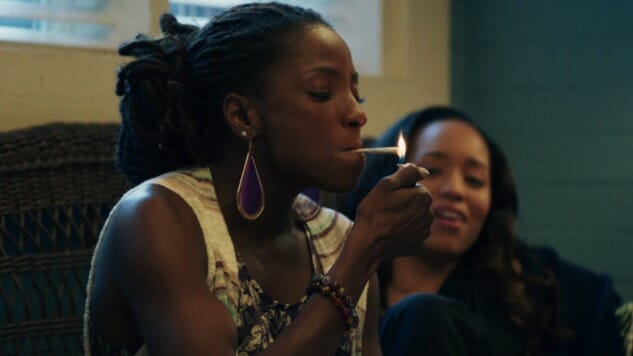I Love Myself When I am Laughing: Queen Sugar and a Carefree Black Womanhood

Everybody has that one auntie, right? Granted, we never sparked up together, but when I was 15 and my two friends from Boston were visiting me in Cleveland, my Aunt Grace pierced Karen’s nose, old school style (lots of ice and blood), while we listened to a Reggae mix she’d made for me. When I was 17 and on punishment for a boyfriend-related fiasco, she told my Uncle (her brother, my guardian) that she was taking me out for my birthday, but she’d actually gone and picked up my boyfriend for me, so we could spend the entire day together. (If you’ve ever been 17 with a significant other who you were totally going to marry in like four years, you can imagine how much this meant to me.) When I was 18 and I got my first apartment, and those same two friends came back to visit, she bought us more liquor than should have been legal (and yeah, it was illegal, Aunt Grace), and then taught me how to sober up my very drunk friend the next day. If my mother, her twin, had been living, she probably wouldn’t have gotten away with these things—or maybe she would have and they would’ve just been our little secrets.
My Aunt Grace is gone now too, but thankfully, I caught a flash of her on the latest episode of Ava DuVernay’s Queen Sugar. A scene that showed Aunt Vi (the great Tina Lifford) smoking a joint and cutting up (and cracking up) with her nieces Nova (Rutina Wesley) and Charley (Dawn-Lyen Gardner) reminded me of how much my survival has been dependent on having the kind of family and friends who will smoke or drink with you, laugh with you and be completely inappropriate, during those times when you need it most. This short scene is a testament to the wonderful things that can happen when you put a camera on a group of black women—varying in ages and personality—and let them be, momentarily, carefree.
Queen Sugar isn’t meant to be a good-time, feel-good show. Its themes are heavy and intense, and of course socially important. In “By Any Chance,” we’re still dealing with Charley’s trying to manage her husband’s rape case, which made for a powerful storyline—especially as we met his accuser for the first time. Nova is fighting to be a voice for the voiceless young black kids in her neighborhood and Ralph Angel is realizing that legal money for an ex-convict is slow and full of disappointments. And Aunt Vi, clearly one of the sharpest characters on the show, is forced to work for a petulant child, the manager at the restaurant where she waitresses.
-

-

-

-

-

-

-

-

-

-

-

-

-

-

-

-

-

-

-

-

-

-

-

-

-

-

-

-

-

-

-

-

-

-

-

-

-

-

-

-








































